

The 6 C`s of Education for the 21st Century - Infogram, charts & infographics. The illiterate of the 21st century will not be those who cannot read and write, but those who cannot learn, unlearn and relearn.
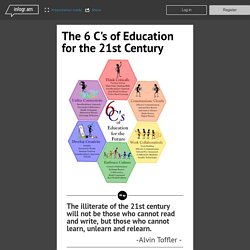
CRITICAL THINKING allows the individual to manage information. Information presented in a multitude of forms from a variety of media. Information that must be filtered and analyzed, authenticated and processed, and eventually must be synthesized in a form that will be useful to the individual. CRITICAL THINKING is PROBLEM SOLVING, the ability to take information and put it to use to create solutions. COMMUNICATION provides the means by which the individual can present information. COLLABORATION engages the individual in the world they share through association. CREATIVITY provides the avenue for expression. CULTURE encourages the individual to appreciate where we have come from, who we are now and how we can move into the future. CONNECTIVITY places the individual in touch with their world.
Postsecondary Trending Now: Skills that Employers Value. I’m an idealist.
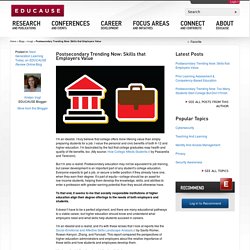
I truly believe that college offers more lifelong value than simply preparing students for a job. I value the personal and civic benefits of both K-12 and higher education. I’m fascinated by the fact that college graduates reap health and quality of life benefits, too. (My source: How College Affects Students by Pascarella and Terenzini) But I’m also a realist. To that end, it seems to me that socially responsible institutions of higher education align their degree offerings to the needs of both employers and students.
It doesn’t have to be a perfect alignment, and there are many educational pathways to a viable career, but higher education should know and understand what employers need and what skills help students succeed in careers. Employers Are Demanding Hard Skills Over Soft Skills, and How Millennials Can Help. One of the biggest challenges companies are facing is the skills gap.
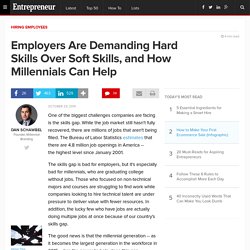
While the job market still hasn't fully recovered, there are millions of jobs that aren't being filled. The Bureau of Labor Statistics estimates that there are 4.8 million job openings in America -- the highest level since January 2001. The skills gap is bad for employers, but it's especially bad for millennials, who are graduating college without jobs. Those who focused on non-technical majors and courses are struggling to find work while companies looking to hire technical talent are under pressure to deliver value with fewer resources. In addition, the lucky few who have jobs are actually doing multiple jobs at once because of our country’s skills gap. What will digital life look like in 2025? Highlights from our reports. This year marked the 25th anniversary of the creation of the internet, making it a good time to look at how the internet had changed lives and what opportunities, challenges and dangers the coming years might bring.
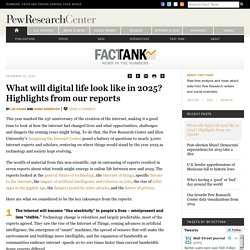
To do that, the Pew Research Center and Elon University’s Imagining the Internet Center posed a battery of questions to nearly 3,000 internet experts and scholars, centering on where things would stand by the year 2025 as technology and society kept evolving. The wealth of material from this non-scientific, opt-in canvassing of experts resulted in seven reports about what trends might emerge in online life between now and 2025. The 25 Hottest Skills That Got People Hired in 2014.
Believe it or not, 2014 is almost over and 2015 is right around the corner.
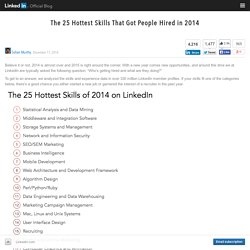
With a new year comes new opportunities, and around this time we at LinkedIn are typically asked the following question: “Who’s getting hired and what are they doing?” To get to an answer, we analyzed the skills and experience data in over 330 million LinkedIn member profiles. If your skills fit one of the categories below, there’s a good chance you either started a new job or garnered the interest of a recruiter in the past year. In addition, we took at look at the top skills in several countries including Australia, Brazil, Canada, France, India, the Netherlands, South Africa, United Arab Emirates, the United Kingdom, and the United States.
Each country’s top 25 skills are included in a SlideShare below. Investing in STEM. PeopleSkills.pdf. The new digital workplace: How enterprises are preparing for the future of work. That the average employee today has better information technology at home than at work has become a standard refrain in discussions of IT modernization.
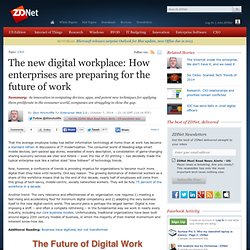
The consumer world of bleeding-edge smart mobile devices, jam-packed app stores, wearables of every description, a constellation of game-changing sharing economy services ala Uber and Airbnb -- even the rise of 3D printing -- has decidedly made the typical enterprise look like a rather staid "slow follower" of technology trends. Now, however, a confluence of trends is providing impetus for organizations to become much more digital than they have until recently.
The College Degrees And Skills Employers Most Want. Practice Note 3: Writing a graduate profile – the industry training organisation experience. February 2012: Graduate profiles are at the heart of the qualifications reforms now being implemented under the reviews of qualifications for listing on the New Zealand Qualifications Framework NZQF).
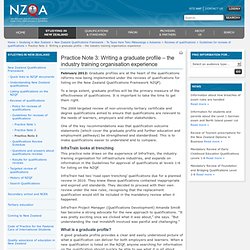
To a large extent, graduate profiles will be the primary measure of the effectiveness of qualifications. It is important to take the time to get them right.